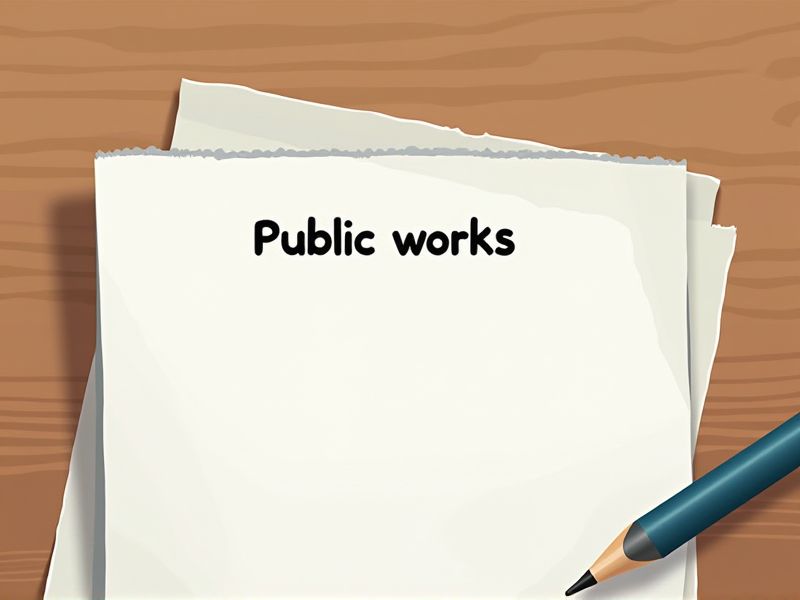
Public works inspectors are responsible for ensuring that construction and maintenance projects meet safety and compliance standards, which demands a comprehensive understanding of industry regulations and technical specifications. Obtaining certain certifications equips them with the necessary skills to effectively oversee a variety of public infrastructure projects such as roads, bridges, and public buildings. Certifications also demonstrate a professional's commitment to maintaining quality and safety, while staying updated on the latest construction practices and technology. Here are several crucial certifications that can enhance your qualifications as a public works inspector.
ICC Certified Construction Inspector
ICC Certified Construction Inspectors are needed for Public works inspectors because they ensure compliance with building codes and safety regulations, reducing the risk of structural failures. Their certification signifies a standardized level of expertise and competence critical for maintaining public safety across infrastructures. They bring a higher level of quality control, minimizing costly errors and rework in public projects. Their presence can enhance public trust and confidence in the durability and safety of community developments.
NICET Public Works Certification (Level II/III)
NICET Public Works Certification at Level II/III ensures that public works inspectors possess the standardized knowledge and skills necessary for effectively managing infrastructure projects. This certification leads to improved project quality and construction safety compliance, as it keeps inspectors in line with industry best practices. By requiring this certification, agencies minimize project delays and errors, which reduces additional costs and potential public safety hazards. Organizations also build trust with the community as certified inspectors are seen as credible and capable in overseeing public works initiatives.
Certified Public Works Inspector
A Certified Public Works Inspector ensures adherence to industry standards, improving project reliability and safety. Certification provides inspectors with comprehensive knowledge, enabling them to identify and rectify issues effectively. This credential enhances credibility and trust, which is crucial for public stakeholder confidence. Certification often leads to better career prospects and professional development opportunities in public infrastructure projects.
Certified Building Inspector
Certified Building Inspectors ensure that construction projects adhere to applicable codes and safety standards, which is crucial for public infrastructure integrity. Their expertise allows them to identify structural deficiencies early, preventing costly repairs or potential failures. They provide an essential check that sustains public trust in infrastructure projects by ensuring consistent quality standards. Their certification signals a thorough understanding of the latest building regulations and technologies, which helps guide compliance during construction processes.
OSHA 30-Hour Construction Safety Certification
Public works inspectors need the OSHA 30-Hour Construction Safety Certification to ensure they are well-versed in identifying and mitigating construction site hazards, thereby reducing workplace accidents. The certification equips them with knowledge about essential safety standards and regulations, which are critical for compliance and public safety. In their role, inspectors must evaluate and enforce safety protocols, and having this certification demonstrates their competency to stakeholders and employers. This standard of safety training helps maintain a culture of safety in public infrastructure projects, leading to fewer project delays and cost overruns due to accidents and violations.
Certified Erosion and Sediment Control Inspector
A Certified Erosion and Sediment Control Inspector ensures compliance with regulations, which can minimize erosion-related damage in construction projects. This expertise reduces project delays caused by non-compliance with environmental standards. Knowledge from certification allows for effective implementation of erosion control measures, safeguarding water resources and soil integrity. In public works, their skillset contributes to sustainable infrastructure, ensuring projects are environmentally responsible and resilient.
APWA Accredited Public Works Manager
An APWA Accredited Public Works Manager is needed for a Public Works Inspector to ensure adherence to national standards and best practices. Accreditation provides inspectors with a comprehensive understanding of infrastructure challenges, which leads to more effective project supervision. Equipped with this credential, inspectors possess the expertise to anticipate potential issues, reducing project delays and costs. The training fosters a culture of continuous improvement and knowledge sharing within public works teams.
Environmental Site Assessment (ISO 14001) Certification
Environmental Site Assessment (ISO 14001) Certification equips public works inspectors with a framework to systematically identify and address environmental risks associated with construction and infrastructure projects. By adhering to these standards, inspectors ensure compliance with environmental regulations, reducing the likelihood of fines and legal repercussions. Certification fosters credibility and trust among stakeholders, as it demonstrates a commitment to sustainable and responsible project execution. With these guidelines, inspectors contribute to minimizing environmental impact, aligning public works with community and ecological standards.
ACI Concrete Field Testing Technician
The role of an ACI Concrete Field Testing Technician is critical for a public works inspector because it ensures the quality and durability of concrete used in construction projects. Proper testing by certified technicians reduces the risk of structural failure, directly affecting the safety and longevity of public infrastructure. Reliable field testing data informs decision-making processes concerning construction and maintenance, preventing costly repairs down the line. Compliance with ASTM standards is guaranteed, which maintains the credibility and efficiency of public works projects.
Fundamentals of Engineering (FE) Certification
The Fundamentals of Engineering (FE) Certification validates the technical competency necessary for a Public Works Inspector, ensuring they possess essential engineering knowledge. This certification fosters trust and credibility in oversight roles, particularly because public infrastructure projects require meticulous inspection. FE Certification equips inspectors with the ability to evaluate structural and environmental engineering aspects accurately. Many public organizations now prefer or mandate certification as it guarantees adherence to industry standards and best practices in engineering.
Summary
By obtaining certifications, you as a Public Works Inspector will likely enhance your credibility and professional reputation. This formal recognition may lead to increased job opportunities and potential salary growth. Certifications often equip you with advanced knowledge, making you more efficient and effective in project assessments. Consequently, the improved skill set can result in higher quality assurance and compliance within public works projects.
